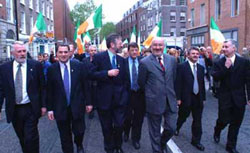 |
Irisch
Republikanische Solidarität
|
 |
Review to resume after elections
It has been announced that the formal review of the Good Friday
Agreement is to resume next Tuesday in Belfast. The North's
political parties are being invited this week to the talks, which
will be attended by British and Irish ministers.
Progress had been reported in talks involving Sinn Fein and the
British and Irish governments in behind-closed-doors negotiations
on the failure to implement the 1998 accord.
The announcement followed talks between the British Prime
Minister's Chief of Staff, Jonathan Powell, and members of Sinn
Fein and the DUP in Belfast.
Mr Powell held two separate meetings with Sinn Fein President
Gerry Adams and Martin McGuinness and the DUP MPs Peter Robinson
and Nigel Dodds at two different locations at Stormont
parliamentary buildings outside Belfast. Senior officials from
the Dublin government were also present.
Among the main issues in the review talks are British
demilitarisation, policing, former combatants who remain
'on-the-run', and the future of the IRA.
As his party embarked on a final push for votes in the European
Parliament and local council elections on Thursday and Friday,
Gerry Adams said parties in the talks would enter the most
difficult and challenging period of negotiations since the Good
Friday Agreement next week.
With polls indicating that all the European constituencies remain
too close to call, the West Belfast MP predicted the party would
make significant political and electoral advances.
During campaigning in north Belfast with Sinn Fein's Six County
candidate, Bairbre de Brun, he said: "From canvassing in the
north it is clear that people are frustrated at the failure of
the two governments, but especially the British government, to
implement the Good Friday Agreement in full.
"However, people are not for giving up on the Agreement and they
and we are determined to see the obligations and commitments in
the Agreement honoured in full by all participants.
"In recent weeks, despite our busy schedule the Sinn Fein
negotiating team has continued to hold intense discussions with
the two governments.
"I believe we have made progress in these.
"The European and the local government election provide an
opportunity for the nationalist and republican electorate to
endorse our efforts and strengthen Sinn Fein's mandate as we
enter what will probably be the most difficult and challenging
negotiations since the Agreement."
Local devolved government in the Six Counties has been collapsed
several times by the British government since the Agreement
establishing the new political framework was overwhelmingly
supported by referendum in both parts of Ireland.
The process has now been stalled since October 2002, when Ulster
Unionist leader David Trimble convinced British Prime Minister
Tony Blair to collapse the power-sharing Executive over
allegations of IRA spying activity, allegations which have since
proved unfounded.
Two attempts to revive the Assembly and power sharing executive
failed last year as the Ulster Unionists and the Irish and
British governments reneged on commitments amid criticism that
disarming by the Provisional IRA was not taking place in public.
The governments have since backed unionist demands for the
Provisional IRA to disband or stand down. Despite these
difficulties, including an election which saw the hardline
unionist DUP become the largest in the Six Counties, all sides
have continued to participate in negotiations.
The DUP has said it will not share power with Sinn Fein unless
the IRA is wound down and there is total disarmament.
It has been reported that Tony Blair and Taoiseach Bertie Ahern
are planning to join the negotiations before the end of this
month.
There is a very short timeframe after the elections before the
contentious Protestant marching season gets into full swing, when
negotiations are traditionally suspended.
Welcoming the announcement that the Review is to begin again next
week Sinn Fein Chief Negotiator Martin McGuinness MP said that
what he described as "intensive discussions" should be
"qualitatively different" from those earlier in the year.
"We need to put in place the modalities and timeframe which would
see an early resolution of all outstanding issues," he said.
He added that for the talks to be productive, they "must be
accompanied by an intensive effort to see the political
institutions re-established and outstanding commitments
honoured".
Letzte Änderung:
13-Jun-04